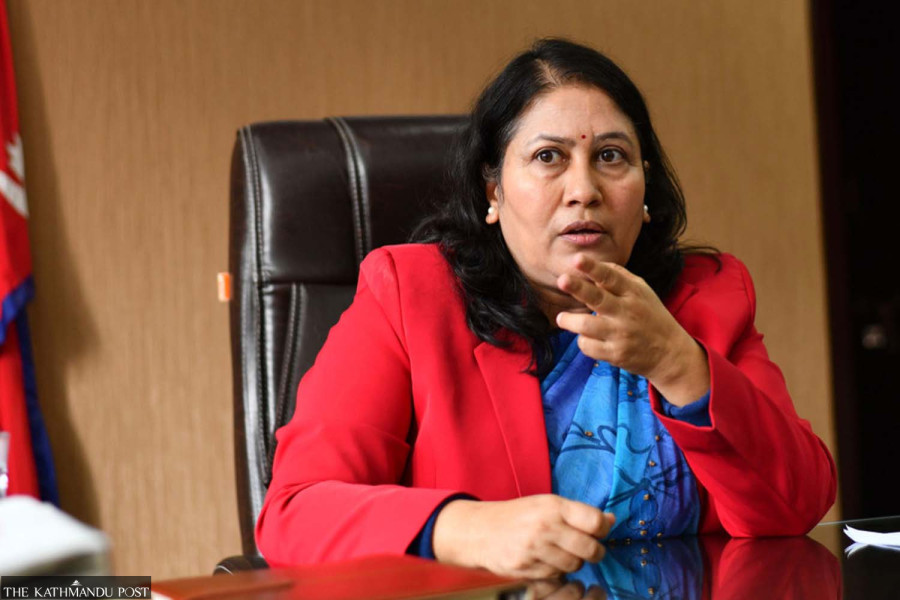National
Education minister resigns after rift with PM, finance minister
Resignation follows refusal by PM Oli and Finance Minister Paudel to address teachers’ demands on perks and benefits.
Anil Giri & Binod Ghimire
Amid growing differences with Prime Minister KP Sharma Oli and Finance Minister Bishnu Paudel, Education Minister Bidya Bhattarai resigned from her post on Monday—at a time thousands of government school teachers have been protesting in Kathmandu for the past 20 days.
However, during the Cabinet meeting on Monday evening, Prime Minister Oli told ministers that Bhattari had not resigned, despite news reports to the contrary.
“She is unhappy with both the prime minister and the finance minister, but efforts are on to convince her to rethink her resignation,” a minister told the Post. “The prime minister will talk to her.”
Bhattarai was appointed as education minister by Oli’s CPN-UML party, and her resignation has sent shockwaves across the government, the ruling UML, and thrown the ongoing teacher’s movement into uncertainty.
During the Cabinet meeting, there was no discussion on the teacher's agitation, said the minister.
The meeting had decided to form a high-level good governance commission headed by the prime minister with 15 private and public entities represented as members.
An aide to the prime minister claimed that they had no knowledge of Bhattarai’s resignation. “No, we have no idea about her resignation,” chief political advisor to the prime minister Bishnu Rimal told the Post. “I even asked the prime minister after media reports began circulating, but he denied it.”
But officials at her office confirmed to the Post that Minister Bhattarai had indeed put in her papers. “The education minister has resigned because of some health issues. She had surgery on her neck,” Ashesh Pokharel, a member of her secretariat, told the Post.
Asked if she had faced any pressure, he said, “We all know this is a tough time. But the resignation was due to health issues.”
However, another official who worked closely with her at the education ministry, said she was under pressure as the teachers had refused to budge while the finance minister had been citing lack of budget for the failure to address teachers’ demand—most notably for pay parity with other public service employees.
Under the banner of Nepal Teachers’ Federation, thousands of government school teachers have been protesting in Kathmandu, and have been warning they would not return to work until their demands, including the passage of the School Education Bill, are met.
Prime Minister Oli and Bhattarai had big differences over addressing the demands of the agitating teachers since teachers hit the streets, two sources close to Bhattarai said.
“Finance Minister Paudel also did not cooperate in fulfilling some of the teachers’ demands. Bhattarai mentioned ‘health issues’ as the reason for her resignation to the prime minister. Yes, she had been unwell sometime back but now she has fully recovered,” a source told the Post.
One of the demands of the agitating teachers is the introduction of the School Education Act, which the minister was positive about, according to sources.
Besides the Act, other demands included hiking the monthly salary of early childhood development teachers, bringing teachers under the social security net, providing remote allowances to teachers, adjustment of grades in the salary structure, and discount for teachers’ treatment at the Kathmandu-based Civil Service Hospital.
As she prepared to address these demands, Bhattarai met Finance Minister Paudel on Sunday and Monday. Addressing the demands would have cost at least Rs150 billion to Rs200 billion a year, but due to lack of resources, the finance minister rejected the proposal forwarded by Bhattarai, according to sources at Bhattarai’s secretariat.
The government is in a deep financial crisis, which is unlikely to improve in the next fiscal year, said the sources.
“If the government addresses teachers’ demands related to salary and other perks and benefits, thousands of civil servants who are ready to hit the streets will ask for similar benefits. So both the prime minister and finance minister did not agree to address all the demands of the teachers, which made her resign,” an official familiar with the talks between Oli, Paudel and Bhattarai told the Post.
After Finance Minister Paudel’s non-cooperation, Bhattarai had gone to meet the prime minister on Monday. When she received a similar response from the prime minister, she finally decided to put in her papers.
But a UML leader claimed that it was Bhattarai’s weak work performance that made her resign.
“The teachers’ agitation could not be resolved and she failed to hold talks with them,” Mahesh Basnet, a UML leader wrote on Facebook. “That is why she resigned. Since she became the minister, her work performance has been weak.”
On Friday, when the prime minister was meeting officer bearers of the Confederation of Nepalese Teachers (CNT) at his residence in Baluwatar, the outgoing education minister Bhattarai was absent.
The meeting was fixed by UML leader Karna Thapa and the absence of Education Minister Bhattarai hinted at her differences with Oli.
The School Education Bill has for long been under discussion at the Education and Health Committee of the House of Representatives, but lawmakers have failed to crack the nut.
Be it the issue of resignation of Vice Chancellor of the Tribhuvan University Professor Keshar Jung Baral or the recent teachers’ agitation, differences between Oli and Bhattarai had been widening, according to officials.
“Her resignation is a sign of chronic dissatisfaction with the prime minister’s working style,” an official at the ministry told the Post.
Before resigning, Bhattarai held a long conversation with prime minister Oli on how to address the teachers’ demands.
Meanwhile, Laxmi Kishor Subedi, chairman of the CNT, said their agitation will continue on Tuesday. “Our agitation will continue,” Subedi wrote on Facebook. “We will assemble at Maitighar at 9 am and protest till 12 pm.”




 9.56°C Kathmandu
9.56°C Kathmandu















